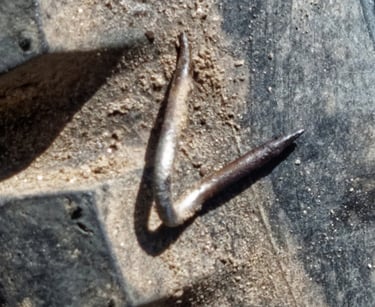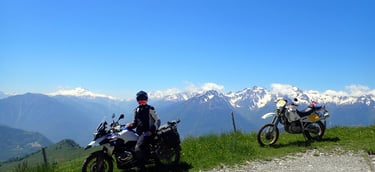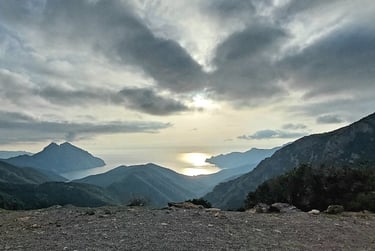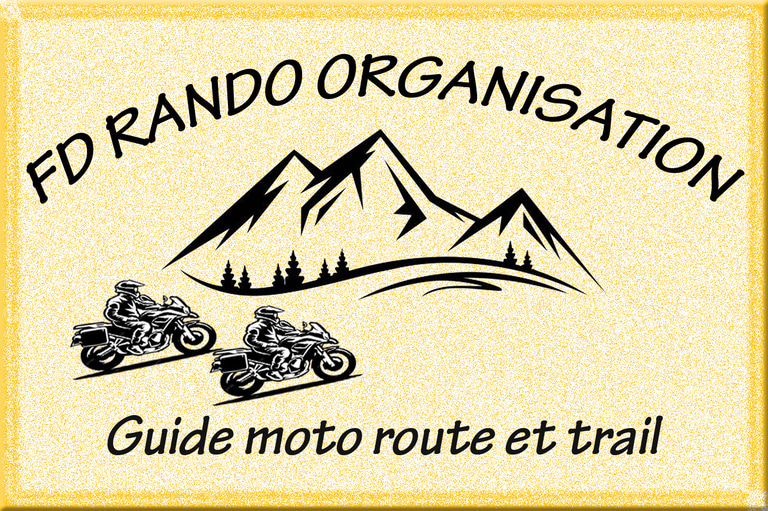
PREPARE YOUR HIKE
My motto “Plan for the worst to enjoy the best”
Preparing for the hike.
First part: insurance
Yes of course, you are insured but, for which problems in particular and for which countries exactly?
*Repatriation in the event of a breakdown:
Do you have assistance that will take you home? You and your vehicle?
Let's take an example. For the majority of assistance, if you twist an ankle while walking and not on a motorcycle, you will be repatriated but not your motorcycle!!!
*Repatriation in the event of an accident:
Remember to check the clauses of your contracts, particularly for medical transport costs, visiting relatives, medical costs in the countries crossed, research costs, vehicle repatriation costs, etc.
*Remember to apply for the European Health Insurance Vitale Card before your departure
*I strongly recommend taking out Individual Accident (IA) insurance of the “multisport Assur” type from April or “Lycéa assurance IA du practitioner” either annual insurance (online subscription) or for the duration of the stay (contact them) which covers all sporting activities even motor sports (option) and which covers rescue and search costs (Especially essential when hiking on trails far from any civilization).
Second part: mechanics
Before leaving :
*Check your vehicle carefully: oil level, full fuel, condition of brake pads, chain tension, lubrication, condition of tires, tightening of wheels, check of accessories, condition of air filter, fuel filter, smooth operation of controls etc.
*Provide structured tires for off-road use (or approved studs).
*Check your tool kit: do you have the basic keys needed to carry out small repairs as well as a puncture kit?
Example: dismantling air filter, spark plug, wheels, chain tension, wick, CO2 cartridge, patches and/or inner tubes, etc.
During the hike:
*Be attentive to suspicious noises and ride while preserving the mechanics (we are not racing).
*Every evening, fill up with gas, check the oil level and review the basic maintenance of your vehicle.
Don't wait until the next morning to ask yourself the right questions.
After :
When you return, remember to do a complete check, identical to the one “before departure”, in order to be ready for a new adventure.
Third part: the driver
These tips should be adapted depending on the type of hike.
Before leaving :
*Rest so that you arrive in great shape.
*In the event of medical treatment, remember to bring your medication as well as the prescription or a medical information sheet. Provide the guide with important information about your treatment.
*Prepare your mandatory papers: driving license, green insurance card, registration document, vital card and European health insurance card. (Note the support number and customer code).
*Give your guide the name of the person to contact in the event of an emergency.
*For glasses wearers, it is advisable to bring a pair of spare glasses (we have never seen a biker with a white cane).
*Ensure that the outfit is suitable for the hike and the driver. Wear clothing that does not restrict movement and circulation. Do not rely on the season because it can snow in summer and be hot in winter.
*For minimum protections, refer to the General Conditions of Sale (CGV).
During the hike:
*Be alert to signs of fatigue and report them to the guide
*Remember to hydrate regularly during the day (water, bottles, camelbag)
*Do not ride faster than your own pace in order to keep up with the group. Do not hesitate to warn the guide if the pace or the route are not suited to your level. The guide will adapt to you.
*Be careful, depending on the region or country, other users do not drive like you! Other countries other rules…
Fourth part: luggage and accessories
All my hikes are planned with a base to make breakfast, lunch and dinner, so just a few cereal bars for the bar costs are necessary.
Anecdotes: during a trail hike, despite my recommendations a client came with all his meals for 5 days, his stove, his chair (SIC) and many other things, he had to give up after a day because riding a motorcycle weighing more than 400 kg was not possible off-road.
*Travel light and calculate your load as accurately as possible.
*Secure your luggage securely. The use of straps is preferable to elastic tensioners. If in doubt, ask the guide to check the securement before departure.
* Test your motorcycle with the load before coming to the ride.
*Don’t forget to bring water and small snacks.
*Stupid thought:
* Have with you a few tissues, a small first aid kit, a camera and for smokers, a pocket ashtray.
*Check the presence of the obligatory yellow vest (But no, we are not going to demonstrate).
*Be in possession of a map or GPS, a mobile phone and its charger.
*Have an anti-theft device for your vehicle.
*Note regarding “go pro” type onboard cameras. Cameras can cause the driver to lose concentration or lose control of the vehicle when operating them. Their fixings must be secure, especially in the event of an accident. If you are equipped with an on-board camera, make sure you master its use and that access to the controls is easy.
Here are some tips and this list is not exhaustive.
A well-prepared hike allows you to fully enjoy the journey and the adventure.






SIÈGE SOCIAL
FD rando organisation
919 route des berres
73390 Chamoux sur gelon
CONTACTS
fdrando73@gmail.com
Tel: +33 (0)6 84 78 85 35


